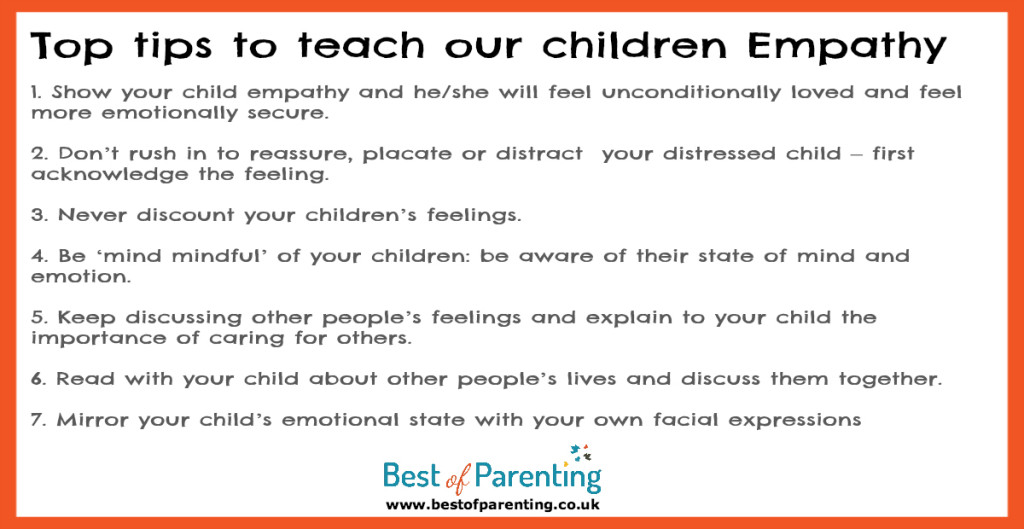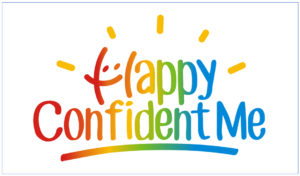What is empathy?
Empathy (definition from the Oxford English Dictionary): The ability to understand and share the feelings of another.
When we show empathy towards a child we are expressing both the compassion and unconditional love which form the very bedrock of a nurturing childhood.
What the experts say about Empathy
Barack Obama, in this speech explains that the biggest deficit in the world right now us a lack of empathy, and that the world would be a better place if we could learn to put ourselves in other’s shoes. Which is why we need to teach empathy to our children from the kick.
Why is empathy important?
According to the experts, our brains are hardwired for empathy, an ability which distinguishes us humans from most other creatures. Indeed so closely do we relate and empathise with our friends and associates that our own self-identity grows from these very relationships.
Why is it important to give empathy to our children?
In order that they feel unconditionally loved and supported by us, children need to understand that we can genuinely relate to what they are feeling. This does not mean that we are accepting and agreeing with their every behaviour, but simply that we should acknowledge their feelings (even if we find that they are exaggerated) before we can help them redirect their emotions.
Yet it is all too easy to inadvertently undermine or dismiss our children’s expression of their vulnerabilities, even when we think that we are trying to help them overcome a painful emotion or experience. When a tearful child hears an adult say “There, there, not to worry, you will be ok soon” the child is more likely to feel more discounted than reassured. Whereas what the child really needs is an expression of acknowledgement of their feeling in the form of an empathic statement, as in “It must have been a shock to fall like that, I can see you feel really hurt by it’. Once your child knows that you can appreciate his or her distress he or she will be readier to hear your suggestions as to how he or she can feel better. As adults we have a similar need for empathy, a statement like ‘Oh you just lost your job? Never mind you’ll get another one soon’ is unlikely to make us feel better, or indeed supported whereas hearing ‘You lost your job, that must feel painful, would you like to talk about it?’ is both supportive and constructive.
Acknowledging someone’s feelings, particularly a child’s, not only tells them that it is ok for them to have that response but that they should be able to trust their feelings in the future too. And once they feel reassured and empowered in this way, children are likely to be more receptive to our suggestions as to how to improve the situation.
For more details and examples about the use of empathy and “emotional coaching”, you can read this article from John Gottman, one of the leading psychologists and researchers on marriage and parenting.
If empathy is hardwired into us why then is it necessary to ‘teach’ it to our children?
Modelling empathy as explained above is often the best way to teach it to our children. This article from Michegan State University explains how, although we are all primed from birth to show empathy, we need to learn from others how and why we should use it. ‘Empathy is the ability to understand another person’s perspective and to consider it before acting. It’s an important developmental process that all children need, but often a difficult skill for young children to acquire if parents do not model or teach it… Empathy is absolutely essential because the ability to feel empathy is the foundation for forming all human relationships. Loving and trusting relationships give young children the ability to feel secure and to see beyond their own needs.’
And once children understand what it is to be loved and nurtured they will be invested in showing the same empathy towards others. Experiencing empathy as a child fosters tolerance and understanding, encourages healthy relationships to be built throughout life and allows the recipient to understand how their choices affect them and those around them.
According to education writer and broadcaster Paul Tough, quoted in this article in Forbes magazine, empathy has been found to be a great antidote to stress and the damage that repeated stress can have on children. Which ‘seems to suggest that empathy has tremendous implications for achievement, both socially and intellectually. Empathy isn’t just something for youth, either. It’s a skill that can transform a community and build social capital.’
Tough points out that developing the ability to feel empathy has implications far wider than merely ‘being nice’ to other people. ‘It is a skill that can make young people more productive in work environments that require cooperation and in a global economy that becomes more complex with each passing day. It is what turns them into future leaders.”
What comes in the way of our children learning empathy?
According to this Washington Post article, the current trend amongst parents to ‘hover’ over their kids, constantly monitoring their state of mind, can backfire, leading children to obsessively over-examine their own feelings. And such self-absorption can interfere with children’s ability to develop a sense of connection and empathy with others, for the rest of their lives.
The article quotes Harvard psychologist Richard Weissbourd, who runs the Making Caring Common Project, as saying says that it is crucial that today’s children are taught empathy from an early age. ‘Weissbourd, said he doesn’t mean that parents should neglect their children or their children’s feelings. But they need to shift the parenting balance so it’s not so focused on the child.’ As Weissbourd says: “We need to get parents to tone down some of that focus on whether their kids are happy and make the higher priority being responsible for others,”
Top tips for teaching your children the art of empathy:
1. Always show your children empathy. Studies show that children are more likely to understand and express empathy themselves if they are used to experiencing it at home. This includes being shown how to deal with negative emotions through “emotional coaching” (ie. first empathise with your child’s feelings, and then coach them out of their emotion).
2. Never discount your children’s feelings as in ‘Stop making such a fuss’, try to hear what they are telling you and let them understand that you have heard. You will then be able to tell them why it they are doing may not be ok and they will be much more likely to listen to you if you have showed them empathy.
3. Don’t try to reassure or placate them by telling them ‘it’s ok, it’ll be over soon’, or ‘don’t’ worry you’ll feel better after you’ve had an ice cream’. Your child needs to know that you are able to recognize how he or she feels in the here and now.
4. Be ‘mind mindful’ of your child from birth. Be aware of your children’s own mental state and encourage them to discuss their feelings, whilst also examining together how these feelings have affected both their behaviour and others.
5. Keep discussing other people’s feelings with your child and encourage them to see situations from other people’s perspectives.
6. Read about other people’s lives. Literary fiction, and biographies, have been proven to encourage kids to identify with the concept of stepping into another’s shoes. http://www.scientificamerican.com/article/novel-finding-reading-literary-fiction-improves-empathy/
7. Mirror your child’s emotional state with your own facial expressions. Not only will it help your child understand that you care, but it will also increase your own ability to empathise. And your child will learn to use this technique on others.
8. Explain to your child the importance of caring for others, particularly those less fortunate than him or herself. You can extend this lesson to explain what can go wrong when adults ‘forget’ to show empathy towards other people, animals or nature.













































